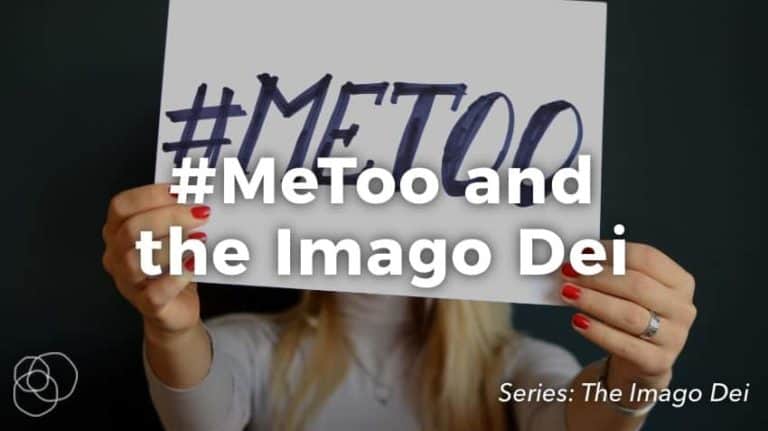
As I type this week's Notes, it is sunny outside and temps aren't sub-zero, which makes it seems like everything is just right in the world.
However, if you lost a loved one this past week, or have family in Nebraska recovering from flooding, or were blindsided by bad news at work or school, the sun and warmer temps probably aren't quite enough to make everything "just right."
During the past two years, quite a few women (& some men) began sharing publicly that they didn't feel "just right," even when the sun was shining. Stories and allegations started coming out of Hollywood and other industries about men who had used their power to manipulate women (and men) into sexual situations. As these high profile stories came public, they reminded people all around the country and world about their own painful moments of sexual abuse and harassment. And as they shared their stories online, they began using the hashtag #MeToo.
#MeToo Statistics
I remember the flood of #MeToo hashtags on various social media platforms in the fall of 2017. The overwhelming number of people (mostly women) sharing their horrifying stories matched the statistics:
As I share these horrible statistics, let me acknowledge a couple of things:
First, this isn't a "women-only" issue. While women have, by far, been the biggest victims of sexual abuse or harassment, some men have received the same sort of treatment, whether from other men or even women. During the height of the #MeToo movement, there were men who shared their own stories of rape, coercion, or harassment. In fact, just this week, a man alleged on Twitter he was drugged, raped, and robbed by a popular female music artist a few years ago. And to back up his story, video of the female artist admitting to this sort of behavior went viral across multiple media platforms.
Second, we need to acknowledge that as the #MeToo movement spread, some of the stories ended up being fabricated. Most likely, these individuals lied in order to gain some of the sympathy being spread, or share in the spotlight. Or some simply wanted to hurt the reputation of another. (This is very unfortunate.)
But just because a few people lied and tragically disgraced the name of someone else, we shouldn't push the entire issue to the side and ignore it. For every person who lied, there are very likely two or three other people who couldn't bring themselves to share their story. And studies have shown the LARGE majority of stories that were shared are true.
The Imago Dei Difference
So let us ask the question we've been looking at during this series: "How does the Imago Dei affect the way we view this issue?"
As we've defined previously, the doctrine of the Imago Dei tells us every human bears the image of God. Although that image has been broken by sin, the image remains and means every human has incredible worth. That image is like a "brand" upon people, saying they belong to God.
And because every human ultimately belongs to God, they are not to be used simply for sexual gratification, especially against their will.
This means rape, coercion, and even physical or verbal harassment is a sin against God and the person being violated. If people perfectly viewed those around them as bearers of the Imago Dei, there would be no #MeToo movement.
Porn & the #MeToo Movement
Now, I realize that for some people reading this article (or this entire series), my thoughts are way too conservative, while for others these thoughts are way too liberal. I realize I am wading in very controversial waters, which is why I asked for grace, understanding, and an open mind in my first post in this series.
But since we are already in these contentious waters, let me give a "hot take." (But please, continue to give me grace!)
I personally believe our pornography epidemic is contributing to the factors that led to the #MeToo movement (and I'm not alone in this belief). Within some corners of the porn world, filmmakers and photographers perpetuate the myth that all women desire sex, and love it when a man aggressively pursues them, demanding sexual favors of some sort. I believe repeated exposure to this worldview leads men to simply view women as body parts that exist for their own sexual pleasure. This belief system causes men (or women) to not value and respect others as image bearers, but rather something to be used for gratification, and in the process breaks relationships, society, and hearts.
If you are struggling with porn usage (and statistics would indicate that many of us in the Riverwood family probably are), you need to know your usage of pornographic material actually devalues the people you are watching for your own arousal (even if it is making them money). To uphold the Imago Dei, you need to stop.
But you most likely can't stop on your own. So here's what I advise you to do:
Lastly, don't lose hope! Just because your battle may have been going on for years, you can through Christ defeat this. (Really!)
But don't resign yourself to an addiction, or fall into the culture's thinking that it's "no big deal." Let us not unknowingly contribute to the #MeToo movement and the pain caused to so many women and men because the Imago Dei was not honored within them.
Receive Riverwood's "News & Notes" weekly email in your inbox. Submit your email address below and stay in the loop.

We are on a mission to help people love like Jesus loved and live like Jesus lived.
It doesn't matter to us if you:
No matter where you are in your spiritual journey, we want to help you become who God has created you to be.